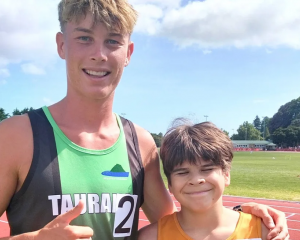Survival and a podium finish are the goals for a group of Otago middle-distance runners when they compete in the Hood to Coast relay in Oregon next month.
Raced from the ski slopes of Mt Hood, 1800m above sea level, and finishing 317km later on the coast, the event attracts more than 15,000 runners, mostly from throughout the United States.
The event features teams of 12, each member running three legs of between 7km and 12km.
Dunedin businessman Russell Lund is again helping send an Ariki Harrier Club-based squad. Lund, who lived in Oregon in the 1990s, first entered an Ariki team two years ago.
It finished third, in 19hr 10min.
Last year he was unable to assemble the same team of 12 runners, and drew on US-based runners to make up team numbers. Eleventh place in a 1500-team competition was no mean feat, considering it was a team cobbled together in the weeks leading up to the event.
"This year, it's unfinished business," he said.
Lund is a fan of encouraging local runners into such events, and takes immense satisfaction in seeing their pride in representing Dunedin and Otago in a world-class event.
"This event is huge. No-one here could imagine the enormity of it. It gets television coverage and film coverage goes into the movie theatres.
"The course itself is practically a 300km-long traffic jam. Not getting tied up in traffic is an event in itself."
Another factor is the heat. In 2010, the team's grading meant it was one of the last away at 6.50pm, but last year it started at 1.40pm and ran the first eight legs in 31degC.
This year's Dunedin team is included among 18 elite teams starting in the final wave, just before nightfall.
The challenge for the first half of the race is to get through the darkness. Runners are guided only by their head lamps and the long procession of bobbing lights spread out in front of them by teams that started earlier.
The first four legs are all straight down, with a 1700m drop alongside a six-lane freeway. Other legs pass through rolling orchard country and on unlit river trails, and there are two steep uphill legs.
"The first three legs are the equivalent of running from the summit of Flagstaff to sea level, at 4min mile pace. And we're doing it in the dark," Lund said.
Dunedin runner Alistair Chisnall ran 3min 56sec for the first mile in 2010, such is the steepness of the altitude drop on the first leg.
"There are no substitutions in this race," Lund said.
"If someone in the team gets injured along the way, the next runner has to run back to the inured runner and finish that leg. The first runner could end up running four legs, instead of three. But basically if this happens, it's game over, and its just a matter of survival for the team."
The relay begins with the first wave of slower teams at 6am on Friday, August 24. The first teams will have a head start of more than 12 hours on the Dunedin team, which will not start until 6.45pm.
The Dunedin team will be captained by Lyndon Marfell-Brown (Caversham) and includes Daniel Balchin, Bevan Stevens, Tony Payne (also Caversham), Caden Shields (Hill City-University), Max Smith, Xavier Walker, Callan Moody, Jessie Gibbs, James List, Shawn Duffy and Jeriah Griswold (Ariki).










